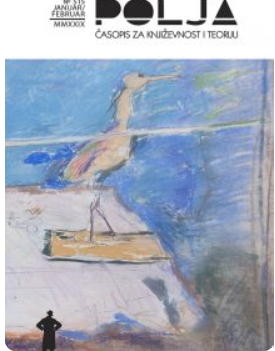
We kindly inform you that, as long as the subject affiliation of our 300.000+ articles is in progress, you might get unsufficient or no results on your third level or second level search. In this case, please broaden your search criteria.

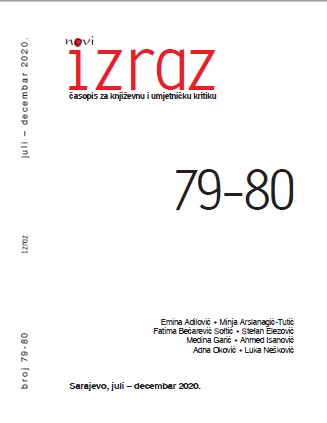
Review of: Fatima Bećarević Softić - Rumena Bužarovska, Nikuda ne idem (Sarajevo: Buybook, 2019).
More...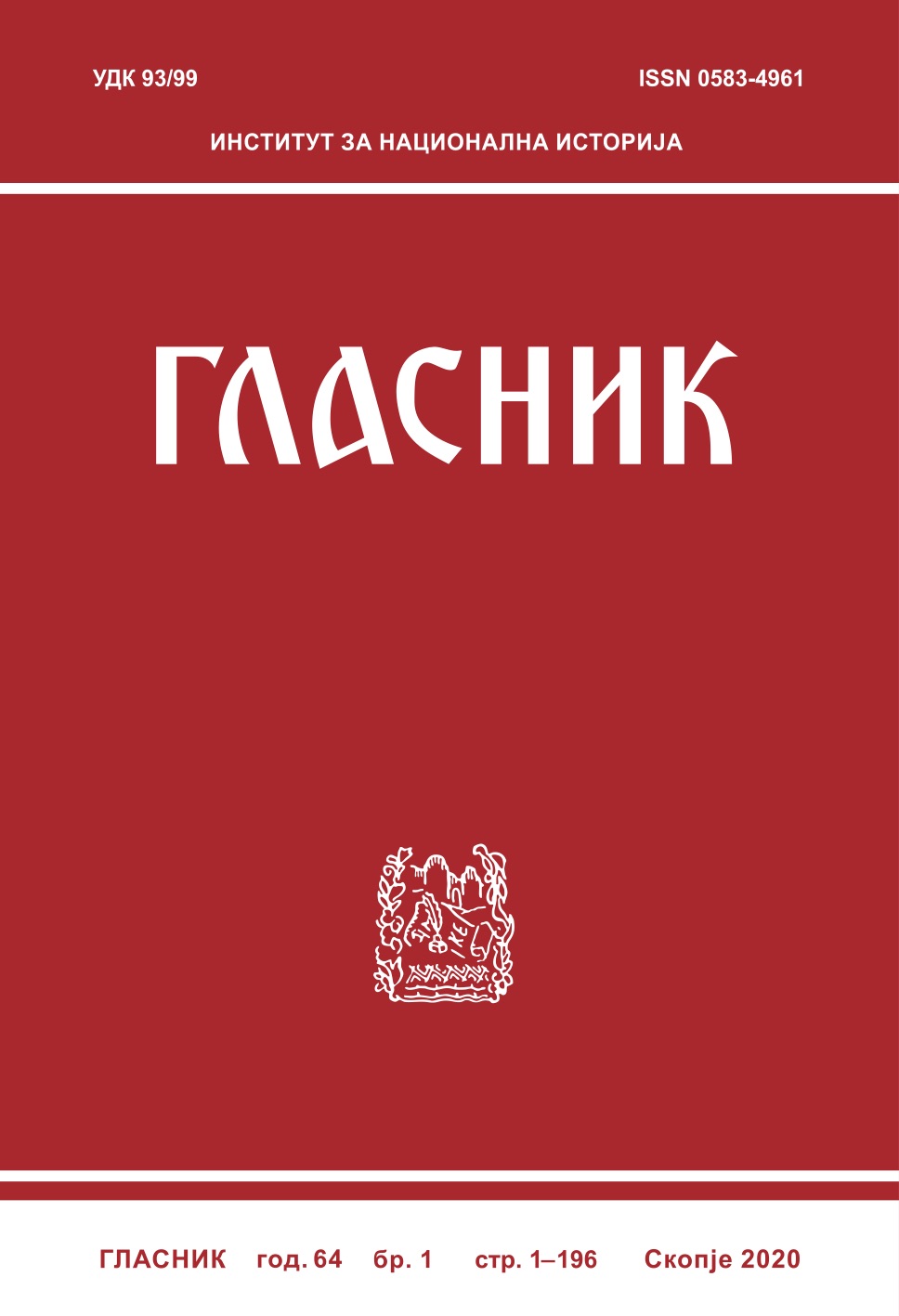
The subject of our interest is the dialect vocabulary in the works of Macedonian writers, descended from Aegean Macedonia, e.g. Tashko Georgievski, Paskal Gilevski, Petar Shirilov, Ivan Chapovski, Kata Misirkova-Rumenova, Risto Jachev, Georgi Georgievski and others. These writers refer to the dramatic events of the civil war in Aegean Macedonia, and the fact that they are witnesses and participants in very events, the writings are distressingly reflected in the experience of the writing personalities, narrated in their native speech. In addition to the richness of storytelling and the richness of motifs and linguistic means, the choice of vocabulary confirms the high literary and aesthetic value of the work, and contributes to preservation of many dialects, for example, in the language of Tashko Georgievski: aresa se, boj, deksa se, dira, kadro, ljoljo, obide, fraska, shavne. Ivan Čapovski‘s language is also characterized by dialectisms thus enriching the language with words from the vernacular: bishka, boravi, vardi, kinisa, lafi, napkum, okara, omjaz, pala, pljachki, puli, shej. In the dialect layer of the linguistic expression by Paskal Gilevski, a native speaker of the Kostur Region dialect, there are, for example: chupa, laf, nikul, vardi, namnisa, puli, tavri, tagari etc., and in the language of Petar Shirilov, descended from the Lerin Region there are: argasa, gagari, garvali, klava, odaja, peshnik, setnina, chevre, shmetka.
More...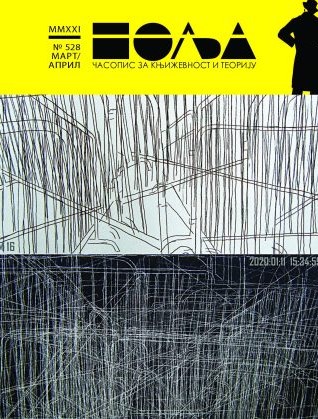
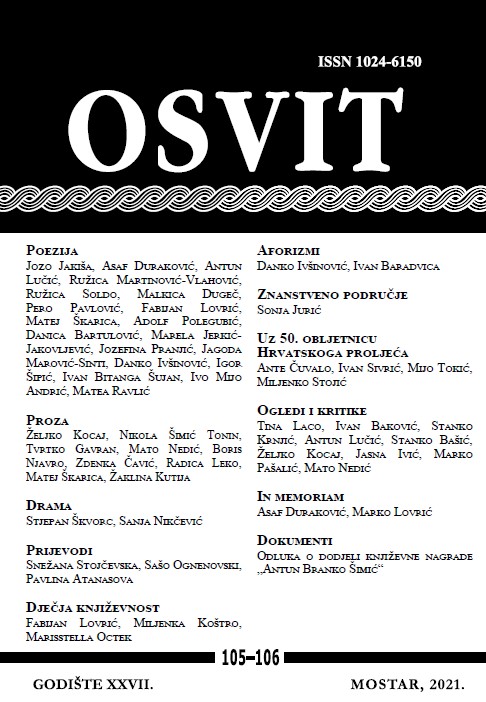
Poetry by Snežana Stojčevska ("Mjakovina"; "Genetika"; "Razlike")
More...

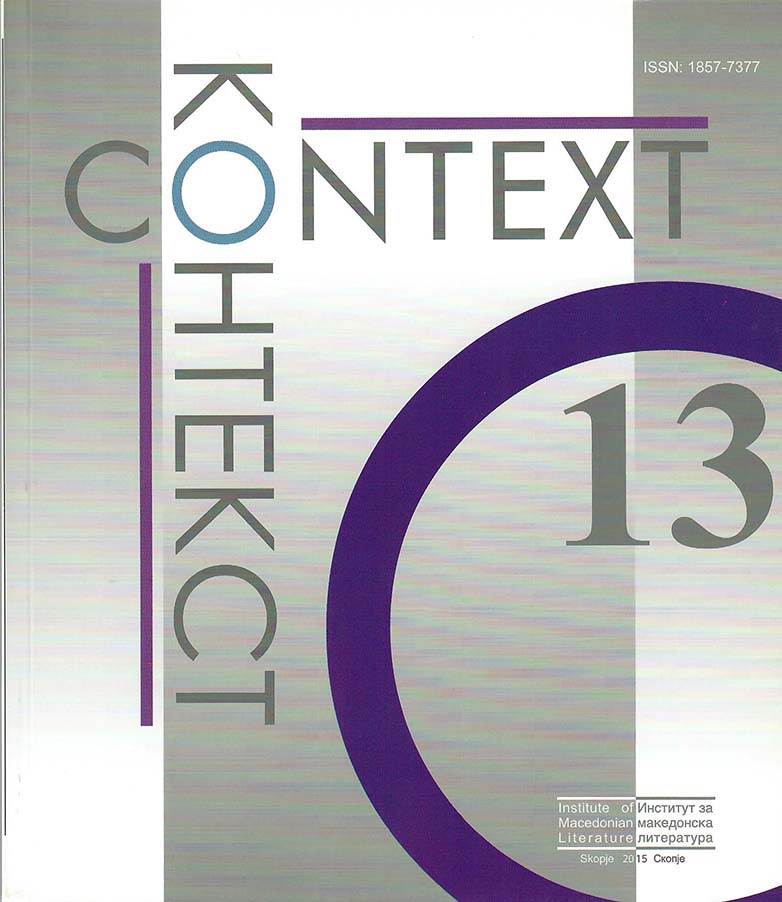
The article deals with the practical aspects of the literary education hic et nunc. Having its starting point in the global crisis of the humanities, it questions the possibilities of the most appropriate organization of the educational process in faculties of philology in Republic of Macedonia. It suggests the necessity of double approach in literary education: from the perspective of the national literary canon and from the perspective of its various, more narrow, or more wider contextualizations. So, it emphasizes the importance of Slavic, and especially South-Slavic context for the proper teaching of Macedonian Literature, but also points out the relevance of the Mediterranean, the Balcans’ and the European contexts.
More...
In the novel Your = my eyes the author Hristo Petreski managed to penetrate into the Otherness of space and time of “You”, as the space in which he actually equates, flows, and finally realizes himself as “I” in / through “You”. He seems to say: I accept myself as you see me! My identity/appearance depends on you! And, in the meantime, excerpts from life, as a trailer for a film, in different locations and about various current and / or older stories / destinies of various people with various professions are narrated. A thin but a complex book, formally presented as a dramatic text from the era of the ancient theater - “prologue” versus “epilogue”, and between them something that is typical for the period of romanticism, a section entitled “diary”!
More...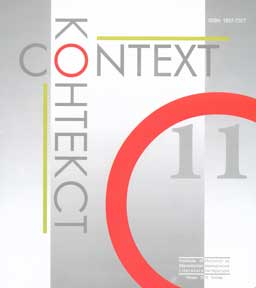
Everyone become in the reality world with his one language. The language is our identity, because in every theory for identities, hay many they started from different perspectives, they all have one common determinant ñ the language. There for, UN introduced the initiative for waking and strengthens awareness for uniqueness and value for linguistic diversity and for perceiving the interdependence between language, culture and identity. For Macedonian people, specifically in 19 century, the Macedonian language was an authentic product of the national spirit and most important constituent of the Macedonian nation, as the other nations. The different between the Macedonia intellectuals, revivals and the others nations was that that the fait for Macedonian language was at the same time and fait for freedom, for autonomy, for renewal of the Ohrid Archbishopric i.e. the Macedonian Orthodox Church, for Macedonian nation and Macedonian identity. With their activities they had done a lot. They had open the way Macedonian common language to be came in Macedonian literature language. There for we have to keep, cherish and respect our language because with it we keep our culture, our history and memory, our name and identity.
More...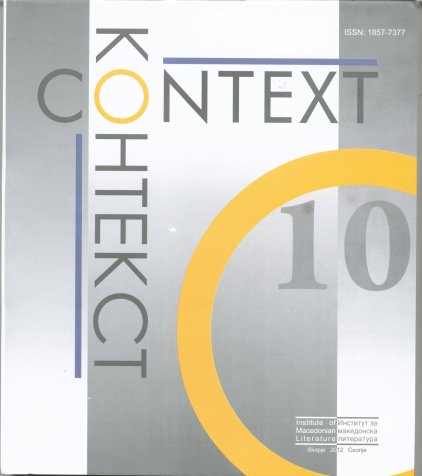
This paper deals with the coverage of Macedonian studies at international conferences on Slavic studies, with a special emphasis on the participation of Macedonian Slavicists in the period from the conferences held in Moscow - 1958 to those held in Bratislava - 1993, thus covering a part of the papers presented by the first Macedonian Slavicists who took part in the said conferences and in this way promoted Macedonian Slavic studies internationally. In that sense, the introduction will focus on the paper titled On the Stylistic Syntheses in the Development of Standard Macedonian, which Blaze Koneski first presented at the conference in Moscow, and then move on to take a look at the different topics from Macedonian studies that were dealt with at conferences on Slavic studies, paying special attention to the development of the Macedonian language, literature and culture, primarily with Blaze Koneskiʼs presentations during the said period, as well as those by other renowned Macedonian linguists, in various linguistic disciplines, such as Bozho Vidoeski in the field of Macedonian dialectology; Todor Dimitrovski, Radmila Ugrinova-Skalovska and Blaze Ristovski in the field of the history of standard Macedonian; Olivera Jashar-Nasteva, Ruza Panoska and Blagoja Korubin in contemporary Macedonian; Boris Markov in contrastive grammars of the Slavic languages; Kiril Penushliski in the field of folklore; Haralampie Polenakovik and Gane Todorovski in the field of the history of Macedonian literature; Aleksandar Spasov and Milan Gjurcinov in contemporary Macedonian literature, and others.
More...
Macedonian and Slovene are two related languages that belong to the South Slavic family of languages. They have phonetic-phonological features that on one hand are similar, but on the other hand are different. This research will show the right image of the direction of their mutual developments. The main subject of this study is a comparative analysis of the phonetic system of both languages, with emphasis on phoneme /v/. Phoneme /v/ is the most complex phoneme in the Slovene spoken literary language, with the most allophones and normative deviations. On the other hand, in the Macedonian literary language this phoneme is an obstruent but the distribution features are specific according to the sonant character of /v/. The appearances that should be explored are the features of the consonant groups in both languages as well as their assimilative and dissimilative processes manifesting in the frames of these groups. In the usage of the standard language speech forms in different language areas, deviations from the normative form are attested in both languages (Macedonian and Slovene). Hence in Macedonian, the deviations from regular pronunciation of the vocals and of the right prosody are emphasized. While in Slovene there is a distinction in speech forms, especially of the sounds in some positions of the phoneme /v/. These remarks point out the need of making a solid analysis on the situations and regulations of the orthography norms that at the present time are missing from both languages.
More...
Автор данного труда обработывает место и роль русской литературы в формировании и развитии творчества молодого македонского писателя Александра(Ацо) Караманова. Когда уже ему исполнилось 15-16 лет, он в оригинале читал Достоевского,Чехова и других русских классиков. Из русскох поэтов ему самые любимые были Пушкин, Лермонтов, Маяковский, Блок, Анна Ахматова и другие. Все они, более или менее, сыграли значительное влияние в поэтическом творчестве Караманова. При том автор труда более подробно останавливается на влияние каждого из этих и других русского поэтов в поэзии этого македонского поэта, а также и на влияе всех русских прозаистов в его прозаическом творчестве.
More...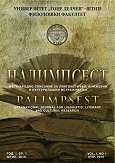
Significant place in Macedonian literary critics and in contemporary Macedonian literature in general, takes Venko Andonovski - an author, poet, essayist, dramatist, publicist and university professor. This paper represents the review of the literary- critical and literary- theoretical thought that Andonovski presents in the book “Decoding (literary studies)”. Firstly the author’s general data are presented, following the essential specifications for the texts which are part of this book. In conclusion of this paper it is emphasized that in “ Decoding (literary studies)” the essential issues from many known disciplines such as literary theory with its basic sub-disciplines (narratology, dramaturgy, theory of poetry), literary history, literary critics, semiology and philosophy are elaborated.
More...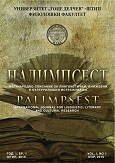
This paper presents an interpretation of the collection "Bad Aunt and Other Short Stories" by Slavcho Koviloski from а specific semantic-symbolic aspect. These short stories by Koviloski are interesting in regard to their structure, as well as the specific way of unveiling the events dominated by humour, irony and self irony. In the conclusion of the paper it is emphasized that the events in these short stories are presented in a very simple, skillful and masterly manner, and the ideas and messages to the recipients are conveyed in the same way as well.
More...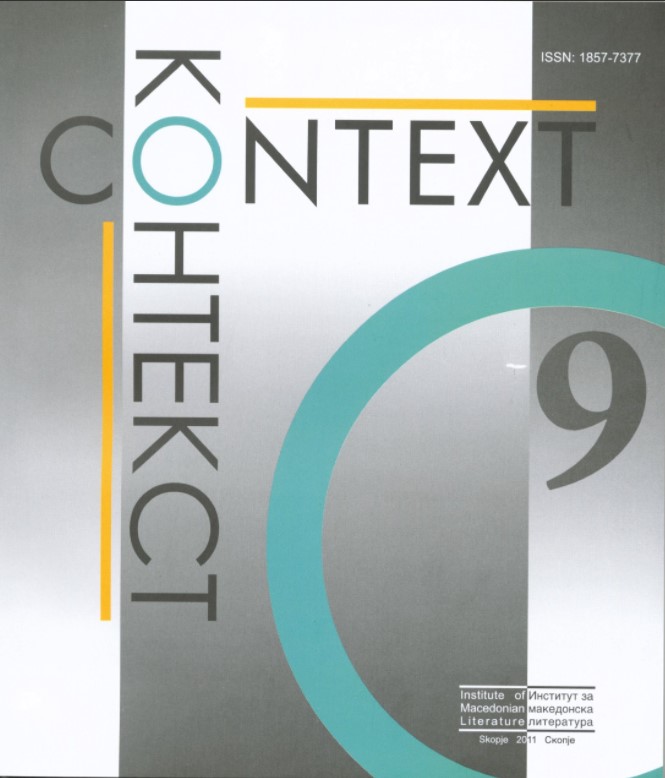
Starting with the idea that Studies of Culture is much broader notion then Cultural Studies, the main aim of this article is twofold: to give a clear picture of the establishment and development of the Studies of Culture and of the Cultural Studies in Macedonia, and also to offer a possible solution for the most acceptable translation into Macedonian of the notion “Cultural Studies”. Therefore, several deferent solutions are analyzed in this article, mainly in the context of Ludwig Wittgenstein’s and Stuart Hall’s theories, and finally as a most appropriate solutions for the translation of the notion “Cultural Studies” are considered those two: “kulturni studii” (културни студии) and “kulturološki studii” (културолошки студии).
More...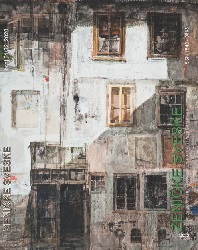
Zagrlili smo se. Nisam ga video godinama, zadnji put još pre Vladisavljevog pohoda na Drač, kada smo čekali vesti od gospodara Dragomuža, te sam tada odmah iskoristio vreme da odem do manastira. Još pamtim neke reči koje mi je Simeon tada rekao, odkako sam mu ispričao kakve me nevolje snalaze – "vremena su loša, neizvesno je koliko će još država da izdrži protiv vasilevsa, moja žena Marija je pred drugim porođajem, a moj brat, iako dvanaest godina mlađi, ne podnosi moje tutorstvo..."
More...
The review of: Aleksandar Prokopiev, 222 antiupatstva za lična upotreba 1978-2018, Avant Pres, 2020., Skopje
More...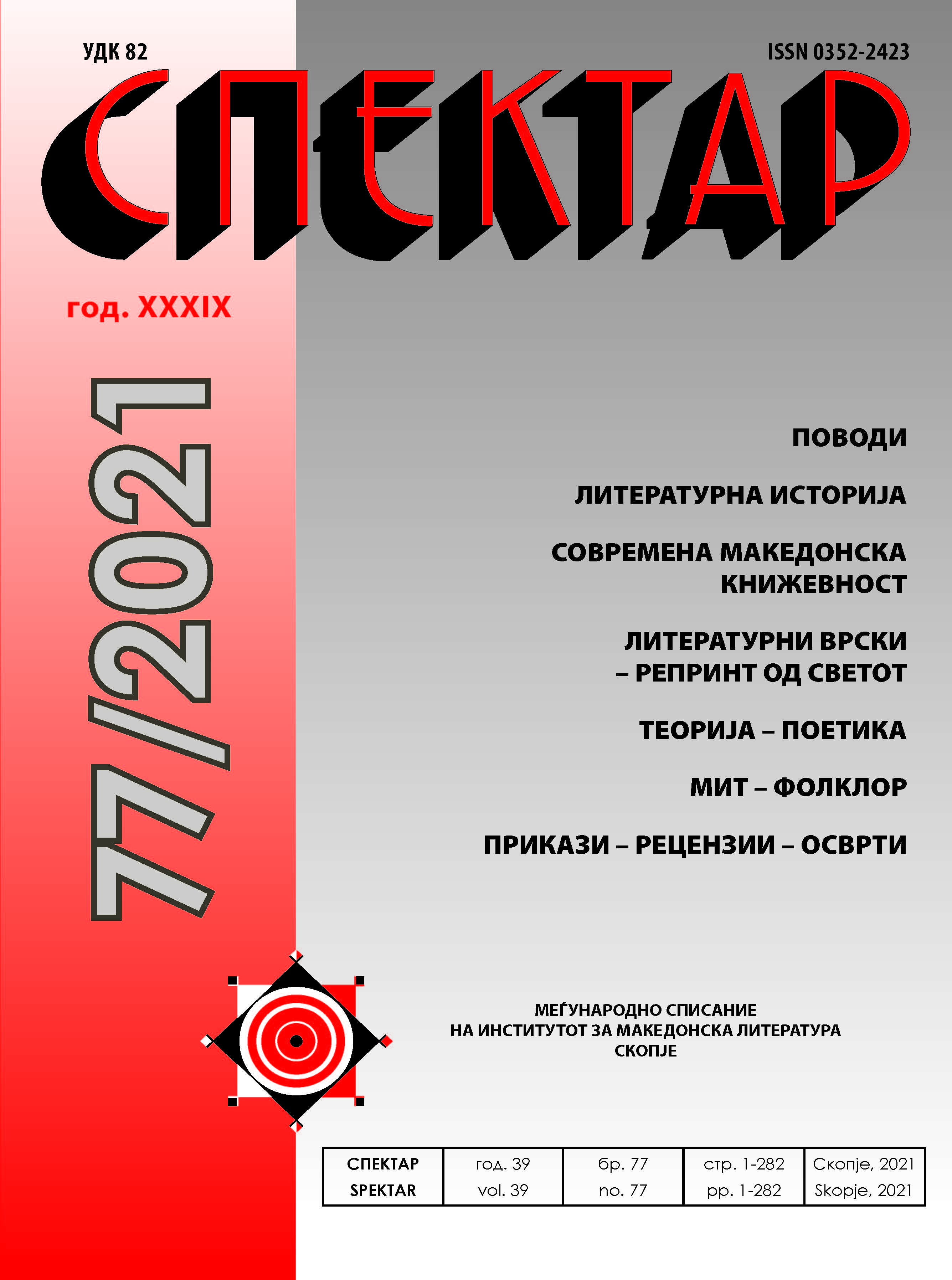
The issue of the use of pseudonyms, anonymous, initials and abbreviations in the 19th century is one of the most difficult, but also the most important for understanding the quantity and quality of Macedonian literature of this period. Finding and establishing the true identity of the authors whose pseudonyms are scattered on the pages of periodicals and book covers is a challenge, but also a necessity in order to enrich Macedonian literature with new names and works. Creators use pseudonyms for a variety of reasons (political persecution, fashion, symbolism). In addition to the pseudonyms that are quite present in our literature from the 19th century, a large part belongs to the anonymous, initials and abbreviations. On a much smaller scale we encounter a different way of hiding our identity, the graphonym. With this type of pseudonym, the author’s own name is replaced by signs, numbers, various numeral or other designations. Many Macedonian writers signed their works as anonymous, as well as under pseudonyms, starting from Konstantin Miladinov, Andreja Petkovic and Kuzman Shapkarev, through Natanail Kuchevski, Rajko Zhinzifov, Evtim Sprostranov, Josif Kovachev, Dimitar Makedonski, to Kosta Shahov, Georgi Kapchev, Petar Pop Arsov, Evtimica Jancheva, Krste Misirkov, Dimitar Molerov and others. In doing so, we found that the choice of the pseudonym is not random, but a product of the author’s psychology. Thus, for example, Krste Misirkov signed with K. Pelski, which actually designates his birthplace Postol or the old Macedonian capital Pella. So, in specifying the true identity through the process of deciphering the abbreviations and pseudonyms of the authors, we were faced with the use of abbreviations (K., N. P. F., E-Sv); signs and symbols (*,?); pseudonyms (Green Pine, K. Suhodolski, Pradoljubov); changing the surname by adding the noun Makedonski (Dimitar V. Makedonski, Gjorgji Makedonski); new surname and / or name (Kalistrat Zografski); by adding the term one (“One Macedonian”, “One patriarchal “), naming signaling local affiliation (Vojdan Chernodrinski, Veleshanin, Ezerski, Vardar,” Someone from the Ohrid Diocese “); obtaining church names (Nathanael Kuchevishki / Zografski / Ohridski, Parthenij Zografode) ), etc. In the paper we also dwell on certain mystifications: Veda Slovena (work of Jovan Gologanov, published by Stefan Verkovic), “King Marko loses his strength” (by Trajko Kitanchev), “Mara voperkata” (with the variant “Mourning of Mara”) (by Evtim Sprostranov), “Siljan the Stork” (by Marko Cepenkov).
More...
This text deals with the novel „Eleven Women“ by Snezana Mladenovska Angjelkov who won the prestigious literary reward „The Novel of the Year“ in 2012, becoming the first debutant writer who ever got it. It also concerns the literary criticism on this novel that is mostly reading it in the line of an atypical women’s writing. That suggest that sometimes they legitimize the prejudice against “écriture feminine” and its presumed characteristics, even without recognizing it. Claims that women’s writing is full of superfluous rhetoric but is rarely insolent, bold, and outspoken must simply be dismissed as sexist prejudices, even if they are used to indicate the apparent quality of the novel itself. This paper stands firm on acknowledging the immanent literary values of this novel, and yet more on the plurality of the term women’s writing, used without the quotation marks.
More...